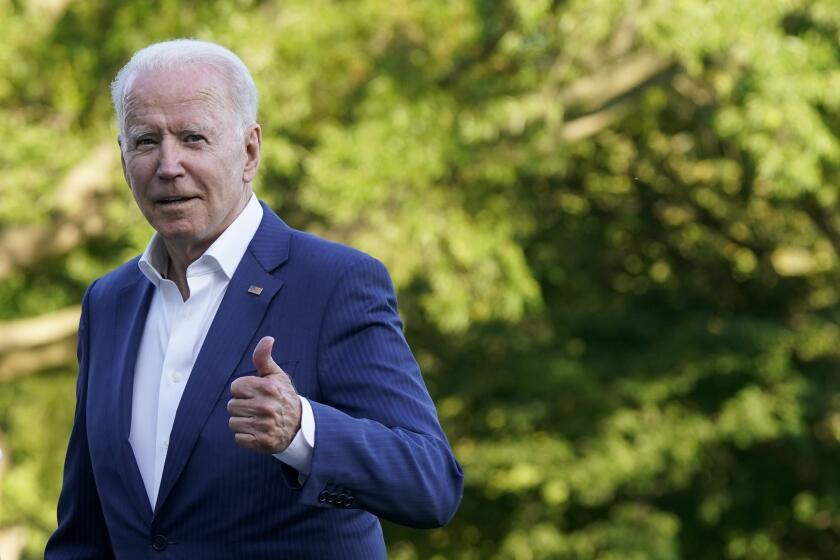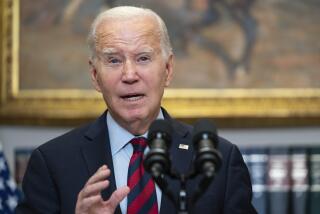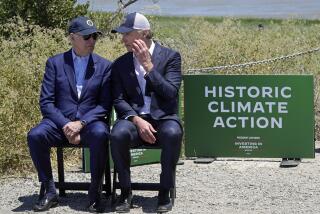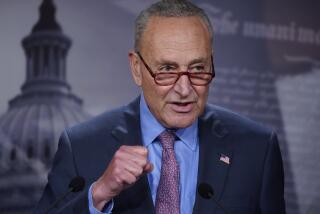Biden talks up bipartisan infrastructure deal in swing-state Wisconsin
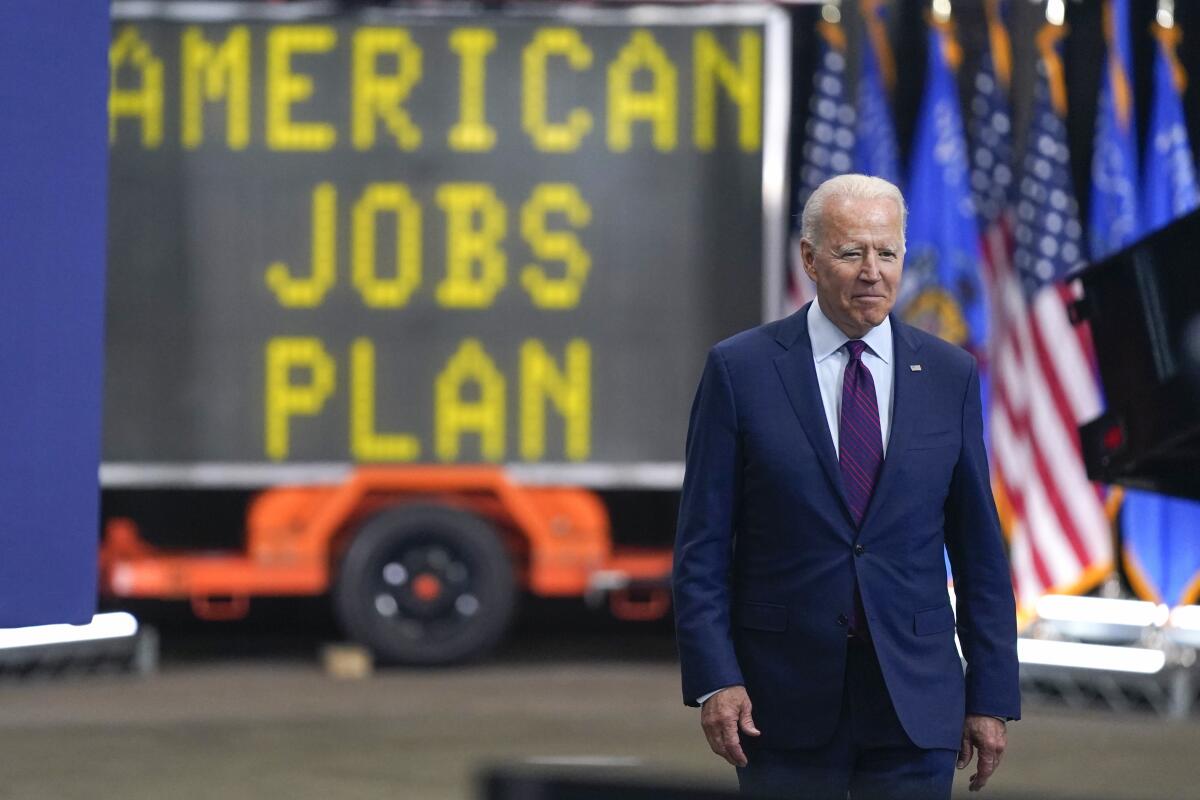
WASHINGTON — Facing a legislative obstacle course in Congress, President Biden campaigned in Wisconsin on Tuesday to build public support for the fragile framework of a nearly $1-trillion, five-year bipartisan infrastructure proposal — “a blue-collar blueprint for rebuilding America,” he called it.
Biden, who toured a transit facility in La Crosse, promoted the specific components of the deal he agreed to last week with moderate senators from both parties.
The president framed the proposal as a “generational investment” in improving roads, bridges, rail lines, broadband networks, water infrastructure and mass transit, and underscored the fact that thousands of jobs could be created as a result.
The bipartisan modernization effort is critical, he added, at a time of economic competition with China and other autocracies. It’s “more than the sum of its parts — it’s a signal to ourselves and to the rest of world that American democracy can come through and deliver for all our people,” Biden said. “We can be united.”
With progressive Democrats frustrated that the proposal was significantly scaled back from Biden’s original $2.25-trillion, eight-year plan, the administration is eager to emphasize possible benefits for clean energy, communities of color and union workers. For example, he said the proposal would “put Americans to work through a first-ever national effort to install electric-vehicle charging stations.”
The president singled out a proposed $49-billion investment in public transit during his remarks in La Crosse, a small city that has already begun a transition of its fleet of buses to electric vehicles to meet its goal of 100% renewable energy by the year 2050. Biden also pointed out that the plan — “the largest investment in clean drinking water and wastewater infrastructure in American history” — would replace the nearly 80,000 lead pipes still used in the state’s water service lines, many in Milwaukee.
“We know that exposure to lead in drinking water can trigger a number of serious problems. Even low levels of lead can cause behavioral learning problems in children, impairing their growth,” he said.
Wisconsin’s infrastructure more broadly received a C on the annual report card of the American Society of Civil Engineers. The state has 979 bridges and 1,949 miles of highway in poor condition, according to an administration fact sheet. Nationwide, it said, the bipartisan proposal calls for more than $300 billion to repair roads and bridges over eight years.
Though polls show public investments in infrastructure to be widely popular, and the deal is bipartisan, its passage once translated into legislation is no sure thing.
Biden’s statement Saturday retreating from a threat to hold an infrastructure deal hostage to a bigger bill has left progressives fretting.
The president nearly derailed the compromise last week after it was announced, when he said he wouldn’t sign it unless it was accompanied by a second, larger bill, a Democratic priority for additional investments in benefits for workers and families that Republicans uniformly oppose.
Republicans who’d supported the bipartisan infrastructure package were taken aback by the president’s explicit linkage of the two proposals. Biden quickly relented, issuing a statement Saturday saying that he planned to sign a bipartisan infrastructure bill if Congress sends one to him, even as he works with Democrats on the second bill.
Some House progressives, however, have continued to say that they won’t vote in favor of any bipartisan bill from the Senate unless the second, larger bill is approved and sent to the House. Their threat holds power given Democrats’ narrow majority in the House.
Sen. Joe Manchin III (D-W.Va.), one of the moderates who negotiated the bipartisan infrastructure bill, is the critical 50th vote for Democrats for a second bill; they would have to move it through the special reconciliation process to avoid a Republican filibuster, but that requires all Democrats’ votes. He urged Democrats on Tuesday to support both bills, neither of which have been written as yet.
“Saying, ‘I’m not going to vote for the other one,’ because you won’t get everything, we’ve never done legislation that way,” Manchin said during an interview on MSNBC. He made clear he’s likely to get behind the Democratic bill, though not one as large as the $6-trillion proposal floated earlier this month by Sen. Bernie Sanders (I-Vt.) and backed by progressive lawmakers.
“If [there are] no Republicans, which I don’t think we will have, then we’ll have to work it through reconciliation,” he said. “I just haven’t agreed on the amount.”
In Wisconsin, Biden reiterated his support for a second bill focused on workers and families, noting that it likely would include an extension of the temporary child tax credit included in the $1.9-trillion coronavirus relief package he signed into law in March.
“People will say, ‘Well, that’s a giveaway,’” Biden said. Lowering his voice to a whisper, he went on: “Hey, guys, I think it’s time to give ordinary people a tax break. The wealthy are doing fine.”
He also continued to argue for a tax increase on corporations and the wealthy to fund additional investments. The five Republicans who reached the compromise with Democrats flatly rejected that proposal, but the president’s eagerness to press his case made clear he believes the populist pitch is a political winner and isn’t ruling out the tax hike to finance the second proposal.
More to Read
Get the L.A. Times Politics newsletter
Deeply reported insights into legislation, politics and policy from Sacramento, Washington and beyond. In your inbox three times per week.
You may occasionally receive promotional content from the Los Angeles Times.
